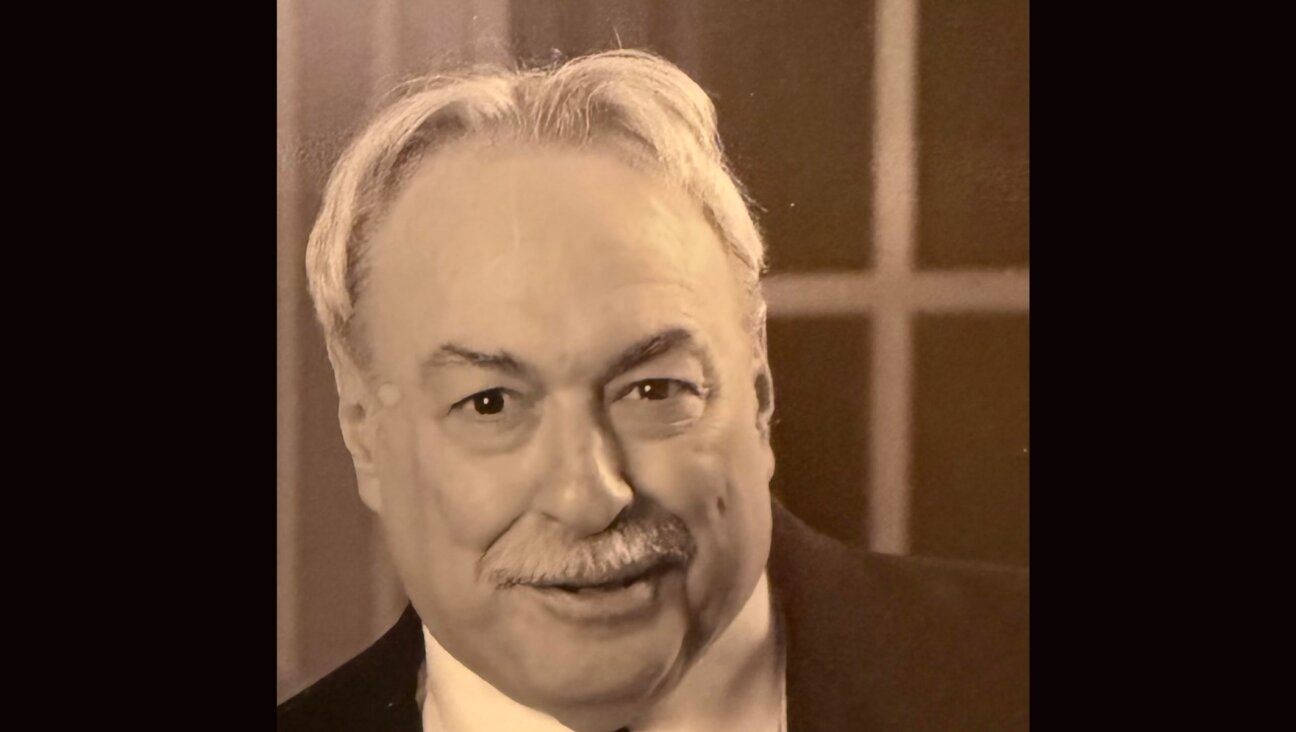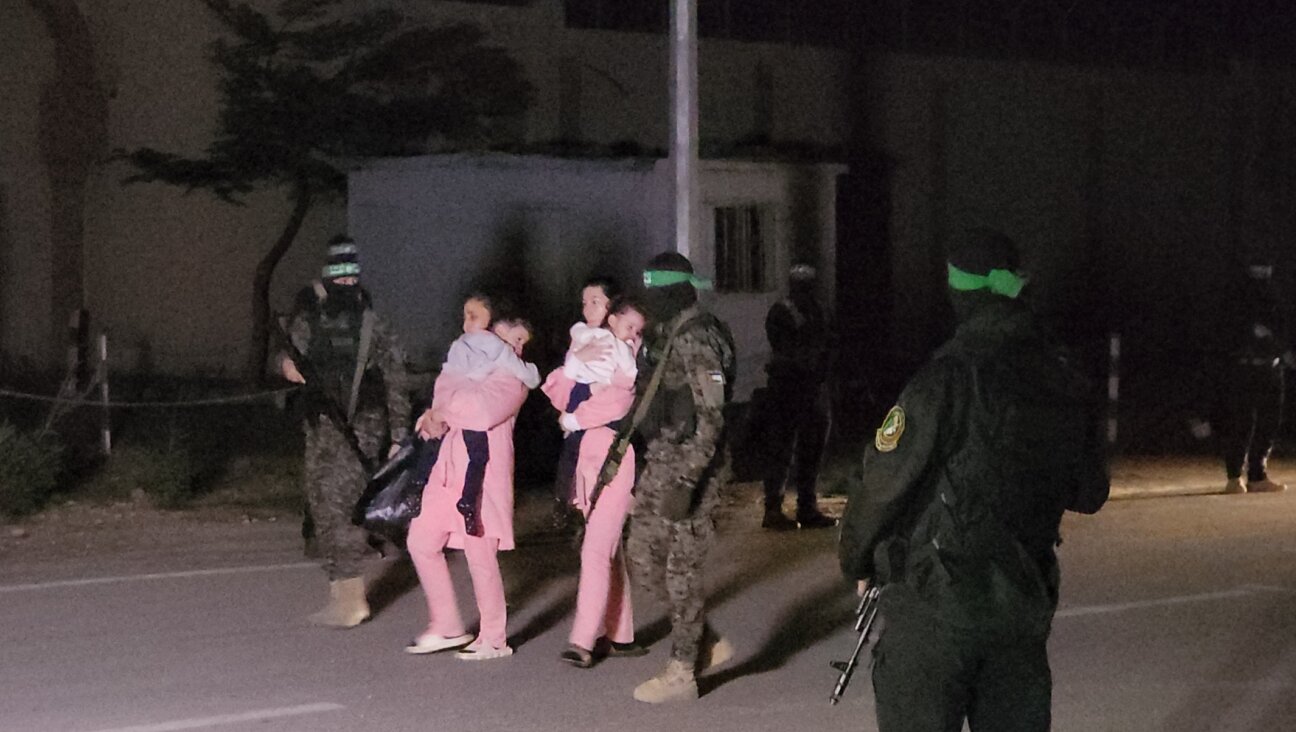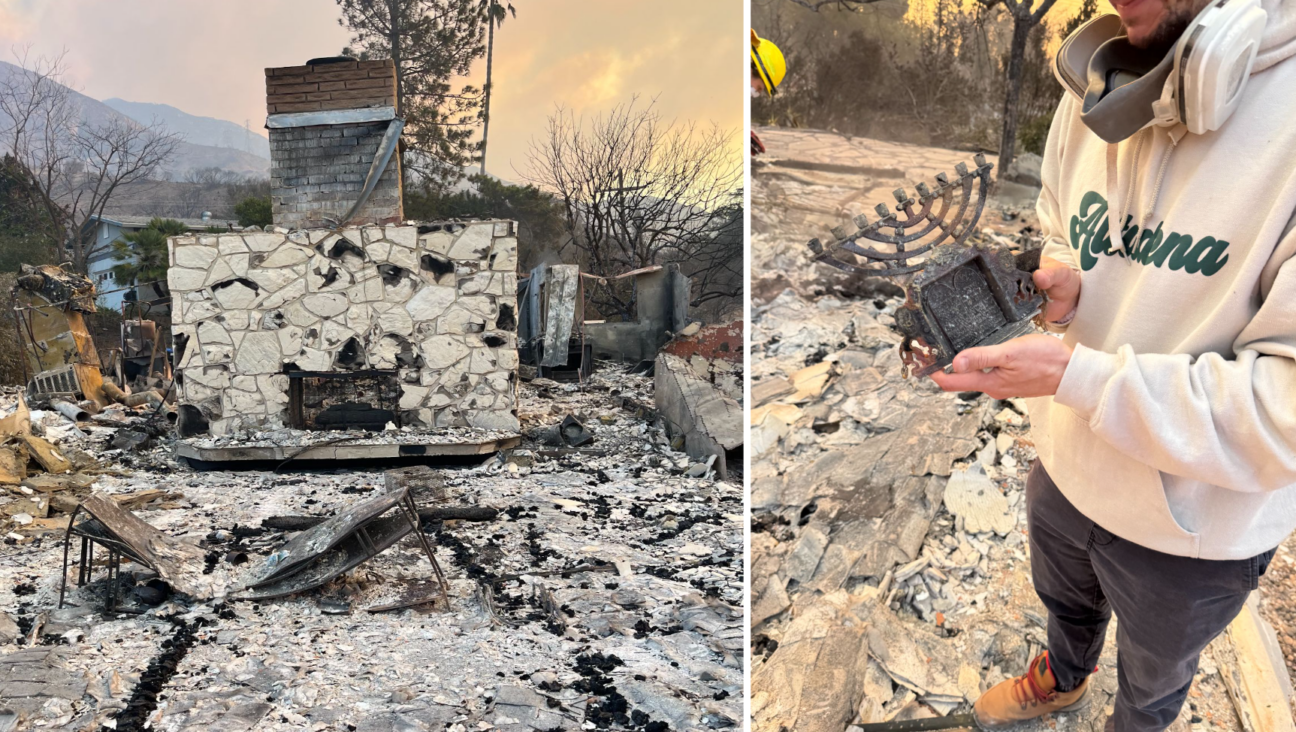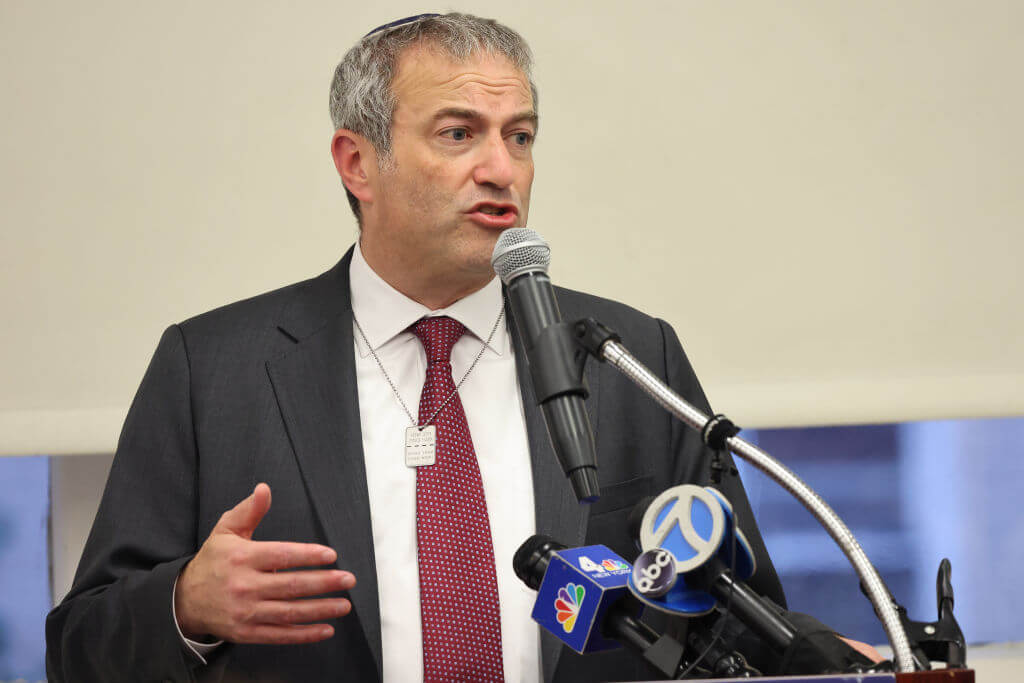First Relief, Then Tracing the Roots of Bloody Har Nof Attack

Crying Out: A man prays at the scene of the Har Nof attack. Image by Getty Images
News of terrorist attacks in Israel can strike us in many different ways. For some the first reaction is anguish; for others it’s rage. There are those who look on with mixed feelings, horrified at the bloodshed yet wanting to understand what drives the killers to such crimes. For still others, it’s that very ambivalence of the onlookers that most infuriates.
For many of us, I’d guess, the strongest reaction is a certain helpless sorrow. The 12th-century Spanish Hebrew poet Yehuda Halevi probably captured that feeling better than anyone in his classic six-line pearl, beginning with the words: “My heart is in the east and I am at the end of the west…”
Then there are the moments when the blood simply runs cold, as mine did on the Tuesday when I woke up to the news of a massacre at a synagogue in the Har Nof section of Jerusalem, and all I could think was, Please, let it not be my brother-in-law and his kids.
It wasn’t. The synagogue the terrorists attacked, Kehillat B’nai Torah, is on Shimon Agassi Street, near the old pizza place, way on the other side of the neighborhood. Place matters. Har Nof wraps around a shockingly beautiful hilltop at the very western edge of Jerusalem, in a place that was once called Deir Yassin.
Reading the news stories, I saw that one of the victims was a distant cousin of a close friend, but not someone I knew personally. I confess: My horror at the savagery was mixed with relief that it wasn’t my own family. That’s how the mind works. We think first about those closest to us. No apologies.
And then comes the anger — waves and waves of it. Not just in Israel. Denunciations of the massacre came from Washington, from Europe and around the world. Even the foreign ministers of Turkey and Bahrain spoke out.
Israel’s prime minister worked hard to channel all that anger and direct it toward a larger purpose. In a way, that’s as it should be. As his nation’s leader, it’s his job both to give voice to the roiling emotions unleashed by the murders and to devise a strategy for fixing things.
Balancing the two tasks can be tricky, though. Giving voice to a nation’s pain calls for fiery passion. Charting a path forward requires cool-headed unflappability. And none of that is any good without the sure-footed ruthlessness to keep a step ahead of rivals looking to upstage you. Benjamin Netanyahu strains to maintain that balancing act.
His balance is particularly shaky when it comes to the chairman of the Palestinian Authority, Mahmoud Abbas. Netanyahu has maintained on and off for years that Abbas doesn’t accept Israel’s right to exist and isn’t a serious peace partner. He points to Abbas’s habit of treating terrorists like heroes and naming streets after them as evidence of intractable hostility. Periodically he’ll turn around and address Abbas as a partner and fellow peacemaker. Then it’s back to the deep freeze.
This fall it’s been relentless. He claims the surging Palestinian terrorism is a product of incitement by Abbas. With each new terrorist attack his attacks on Abbas’s language becomes more intense. After the Har Nof massacre he accused Abbas of “blood libel,” harking back to the crudest medieval Jew-hatred.
This latest indictment rests mainly on Abbas’s claim that Israel plans to change the religious status quo on the Temple Mount and permit Jewish prayer there. It’s been banned for 47 years by an Israeli-Jordanian agreement, in deference to a baroque but fiercely held Muslim religious custom. Three generations of Israeli defense strategists have seen it as a small price to pay to avoid facing 1.5 billion Muslims in a world war.
Now, there’s no denying Abbas’s nasty tone in recent months. Since the summer he’s released a stream of inflammatory rhetoric. He’s called on Palestinians to keep Jews from the Temple Mount “by any means.” He’s claimed Jews “contaminate” the sacred compound. He’s accused Israel of genocide. He’s praised a slain terrorist as a “martyr.” The language contributes heavily to an already toxic, incendiary atmosphere. It’s not hard to see how it could lead Palestinian hotheads to think about murder.
The trouble is, Israel’s security and intelligence professionals don’t believe Abbas’s language is what’s causing the violence. They see no evidence he’s actively encouraging violence. And they keep on saying so.
Squabbles between Bibi and his security chiefs are nothing new. He’s faced a nonstop series of Mossad and Shin Bet chiefs, national security advisers and military chiefs of staff telling him he’s too trigger happy on the Iranian front, too unyielding toward the Palestinians, too antagonistic toward Washington. They tell him the Arab side is ready for peace, that Abbas’s security forces are effectively fighting terror, that crackdowns only create more hostility. He keeps replacing them, only to find the new faces are even more adamant.
What’s happened in the last month is that even the fellow hardliners he’s counted on to back him up in these spats — figures like Foreign Minister Avigdor Lieberman, Defense Minister Moshe Yaalon and even hard-core loyalist Shin Bet director Yoram Cohen — are calling him out. In rapid succession they’ve stood up and publicly declared that if anyone is inciting violence, it’s the far-right faction in Netanyahu’s own coalition.
They’re talking about a parade of right-wing Knesset members and cabinet ministers who’ve been staging provocative visits to the Temple Mount this fall, aimed at pressing the demand for Jewish prayer rights. They point, too, to a bill introduced in the Knesset by hardliners that would formalize Jewish prayer rights on the mount — and very likely incite a wave of Muslim violence throughout the Middle East.
Netanyahu opposes the bill and vows to preserve the status quo on the mount. He calls Abbas’s warnings of change in the status quo “blood libel.” But the moves are afoot. True, Bibi vows to oppose them, and he half-heartedly condemns the rightists’ mount visits. Still, calling Abbas’s fears libelous is a bit much. That, at least, is how the intelligence community sees it.
One thing about security professionals is that it’s hard to shock them. They’ve seen it all, and dished it out as well as taken it. They can be shaken up by the scenes they face after a terror attack, but it’s more in sadness or anger than surprise.
What does surprise them, they say, is how quickly the public lines up with Bibi and dismisses their assessments when they don’t echo the darkest nightmares of the Jewish past. It’s one thing to see one’s fellows repulsed by a slaughter of innocents. It’s something else — something deeply unsettling — to see them outraged by the thought that things might get better.
Contact J.J. Goldberg at [email protected]
A message from our Publisher & CEO Rachel Fishman Feddersen

I hope you appreciated this article. Before you go, I’d like to ask you to please support the Forward’s award-winning, nonprofit journalism so that we can be prepared for whatever news 2025 brings.
At a time when other newsrooms are closing or cutting back, the Forward has removed its paywall and invested additional resources to report on the ground from Israel and around the U.S. on the impact of the war, rising antisemitism and polarized discourse.
Readers like you make it all possible. Support our work by becoming a Forward Member and connect with our journalism and your community.
— Rachel Fishman Feddersen, Publisher and CEO
























